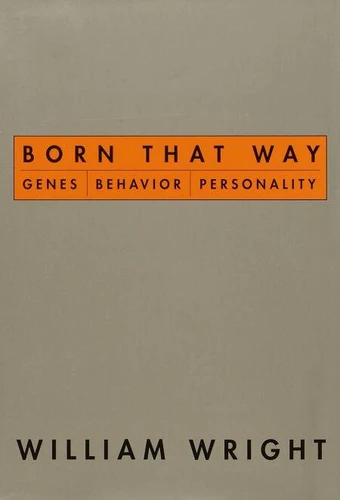Born That Way. Genes, Behavior, Personality
Par :Formats :
Disponible dans votre compte client Decitre ou Furet du Nord dès validation de votre commande. Le format ePub protégé est :
- Compatible avec une lecture sur My Vivlio (smartphone, tablette, ordinateur)
- Compatible avec une lecture sur liseuses Vivlio
- Pour les liseuses autres que Vivlio, vous devez utiliser le logiciel Adobe Digital Edition. Non compatible avec la lecture sur les liseuses Kindle, Remarkable et Sony
- Non compatible avec un achat hors France métropolitaine
 , qui est-ce ?
, qui est-ce ?Notre partenaire de plateforme de lecture numérique où vous retrouverez l'ensemble de vos ebooks gratuitement
Pour en savoir plus sur nos ebooks, consultez notre aide en ligne ici
- Nombre de pages320
- FormatePub
- ISBN978-0-307-81938-3
- EAN9780307819383
- Date de parution06/06/2012
- Protection num.Adobe DRM
- Taille2 Mo
- Infos supplémentairesepub
- ÉditeurKnopf
Résumé
A comprehensive view of the most heated debate of our time -- are genes the primary influence on human personality and behavior? In presenting the recent findings, William Wright argues that in a century dominated by psychoanalytic thought, there has been an insistence that humans, unlike all other species, are brought into the world as blank slates on which personalities are etched by the environment.
Wright describes the overthrow of this view by psychologists and geneticists whose discoveries, most dramatically through studies of identical twins separated at birth, have resulted in the recognition of the major role played by genes in personality and behavior. Wright describes how molecular biologists have reinforced these findings by locating the links between genes and behavior in DNA itself.
And he explores the exciting future prospects of treating such conditions as depression, addiction, and hyper-aggressiveness that are implicit in the behavioral-genetic revolution.
Wright describes the overthrow of this view by psychologists and geneticists whose discoveries, most dramatically through studies of identical twins separated at birth, have resulted in the recognition of the major role played by genes in personality and behavior. Wright describes how molecular biologists have reinforced these findings by locating the links between genes and behavior in DNA itself.
And he explores the exciting future prospects of treating such conditions as depression, addiction, and hyper-aggressiveness that are implicit in the behavioral-genetic revolution.
A comprehensive view of the most heated debate of our time -- are genes the primary influence on human personality and behavior? In presenting the recent findings, William Wright argues that in a century dominated by psychoanalytic thought, there has been an insistence that humans, unlike all other species, are brought into the world as blank slates on which personalities are etched by the environment.
Wright describes the overthrow of this view by psychologists and geneticists whose discoveries, most dramatically through studies of identical twins separated at birth, have resulted in the recognition of the major role played by genes in personality and behavior. Wright describes how molecular biologists have reinforced these findings by locating the links between genes and behavior in DNA itself.
And he explores the exciting future prospects of treating such conditions as depression, addiction, and hyper-aggressiveness that are implicit in the behavioral-genetic revolution.
Wright describes the overthrow of this view by psychologists and geneticists whose discoveries, most dramatically through studies of identical twins separated at birth, have resulted in the recognition of the major role played by genes in personality and behavior. Wright describes how molecular biologists have reinforced these findings by locating the links between genes and behavior in DNA itself.
And he explores the exciting future prospects of treating such conditions as depression, addiction, and hyper-aggressiveness that are implicit in the behavioral-genetic revolution.



